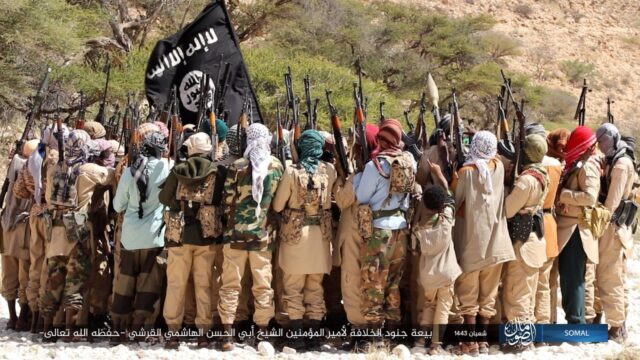
Abdiweli M. Yusuf: Islamic State Financer Captured in Somalia
Publication: Militant Leadership Monitor Volume: 16 Issue: 2
By:

Executive Summary:
- Puntland security forces captured Abdiweli Mohamed Yusuf, the Islamic State–Somalia (IS–Somalia) finance chief, on July 25. While IS–Somalia remains a small force, the removal of key leaders such as Yusuf signals mounting pressure on IS’s financial and operational capacity, potentially weakening the group’s broader presence across Africa.
- Yusuf’s detention follows the 2023 killing of his predecessor Bilal al-Sudani, further constraining IS’s global funding network. Yusuf managed IS-Somalia’s finances, oversaw fund transfers to IS–Central Africa Province (IS–CAP), recruited foreign fighters, and procured supplies. He generated millions of dollars through extortion and mobile-money systems, coordinating with other IS operatives such as assassination squad leader Abdirahman Shirwac Aw-Saciid.
On July 25, Puntland security forces captured the head of the Islamic State’s financial department, Abdiweli Mohamed Yusuf. As Islamic State–Somalia Province (IS–Somalia) appears to be the regional financial hub for Islamic State (IS) operations in Africa, Yusuf’s removal from IS–Somalia could have a broader impact on IS’s overall expansion on the continent (Agenzia Nova, July 25). Moreover, Yusuf’s capture came only two years after the former IS–Somalia financial head, Bilal al-Sudani, was killed in a U.S. airstrike on an underground complex in northern Somalia. This further suggests that IS’s global funding apparatus is now ever more constrained (Garowe Online, January 27).
Yusuf was sanctioned by the U.S. Department of the Treasury’s Office of Foreign Assets Control (OFAC) as early as 2023, two years before his capture (U.S. Department of the Treasury, July 23). At that time, he was reportedly regularly meeting with the al-Karrar office head (responsible for operations in East Africa) and reported to the current IS–Somalia al-Karrar office leader, Abdul Qadir Mumin, as well as then–IS–Somalia caliph, Abdirahman Fahiye Isse Mohamud (Hiiran Online, January 6). Both were designated as terrorists and sanctioned in 2016 and 2022, respectively.
Mumin’s role was more similar to Yusuf’s, considering that Yusuf financed Islamic State–Central Africa Province (IS–CAP) as it transitioned away from being the “Allied Democratic Forces” (ADF) (France 24, June 1). It seems that Yusuf’s role was overseeing the delivery of funds to IS–CAP or other African IS cells after Mumin gave orders. In addition, Yusuf recruited foreign fighters and acquired supplies and ammunition for IS–Somalia while also managing the group’s revenue and facilitating the transfers of funds (Horn Observer, July 28, 2023).
The Puntland government also confirmed Yusuf’s role in IS–Somalia, identifying him as the group’s “finance chief.” Puntland officials also noted that “American partners” took part in the operation to capture him (X/@SomaliSecurityI, July 25). Yusuf was based in Somalia’s Bari region, where only months earlier, the head of IS–Somalia’s assassination squad, Abdirahman Shirwac Aw-Saciid, surrendered to Puntland authorities. Aw-Saciid’s role in extorting local businesses to raise funds for IS–Somalia suggests that he coordinated with Yusuf, given their mutual focus on financing and the fact that they operated in the same area of Somalia (Al Jazeera, February 3). Yusuf specifically oversaw funding networks that generated an estimated $2.5 million in 2021. This was accomplished, like in Aw-Saacid’s case, through extorting local businesses, in addition to exploiting mobile-money systems (X/@TheDailySomalia, July 25).
Although Mumin remains at large, the surrender of Aw-Saciid, elimination of Bilal al-Sudani, and now capture of Abdiweli M. Yusuf could foretell the weakening of IS–Somalia as its leadership is degraded. IS–Somalia, while a small fighting force within its own country, previously functioned as IS’s chief financial conduit in Africa. Thus, the recent victories against IS–Somalia could portend the weakening of IS’s capabilities across the African continent.



